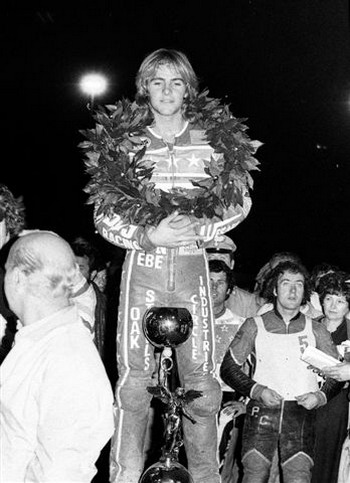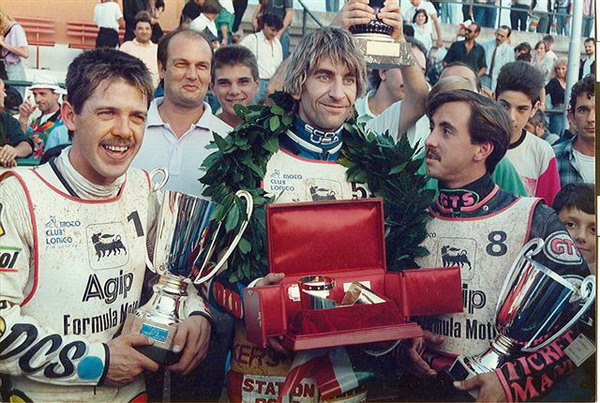
The following equivalents of Golden Helmet competitions are addressed on this webpage:
Master of Speedway - Gy, Dk, Sw.
Gold Bar - Denmark
Gold Bear - Dk. & Gy.
Golden Ribbon - Olching, Gy
Golden Hammer - England
Golden Gala - Lonigo, Italy
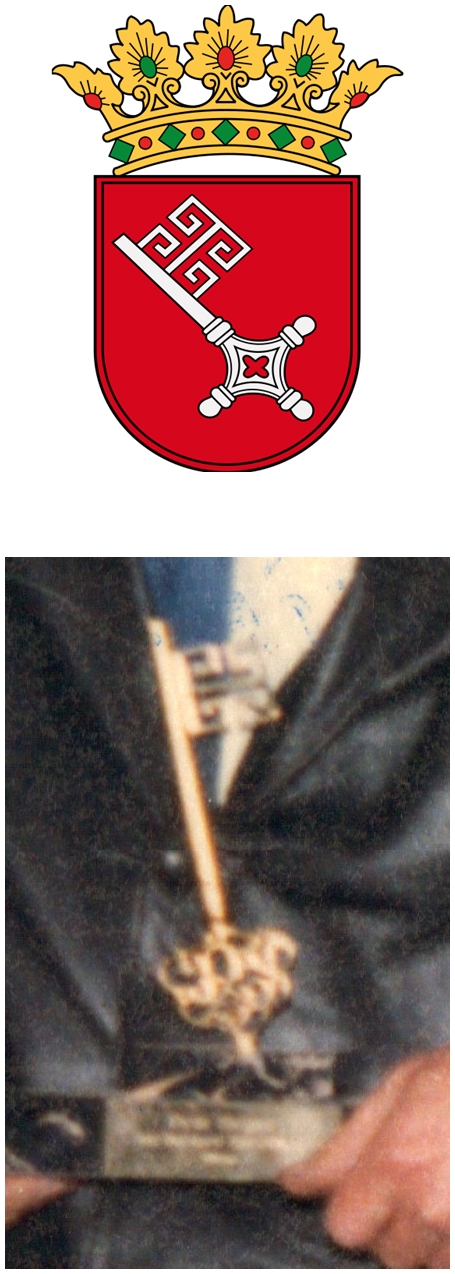
GOLDEN KEY of BREMEN, GERMANY
&
MASTER OF SPEEDWAY
The
Hansa Stadium in Bremen, North Germany held annually post war a major
international speedway meeting on May1st, sponsored by the city
authorities as part of its May Day celebrations along with music,
dancing, beer-kellars and similar festival activities. From 1959 the
city Senators for Welfare Youth & Sport presented an award of a
Golden Key, (a key being the historical city symbol of Bremen,) to
the top rider of the day. The format of competition varied over the
years, (as the Dutch Golden Helmet did,) from straight
16-rider:20-heat individual meetings, to Best Pairs, 4TTs and even
World Championship qualifying rounds, the Golden Key recipient
sometimes decided by an additional 4-man or 6-man Final, sometimes
going to the top point-scorer over all of the days' races.
Later,
the Golden Key was sometimes awarded in conjunction with a meeting of
the 'Masters of Speedway,' series held initially between a few
Hanseatic cities of Sweden, Denmark and Germany from around the
Baltic, - see below. In the final years before the loss of the
stadium to development in 1989 the recipient was the highest total
point scorer of all races, including the Semi-finals and Final, (so
the winner of the Final of the day may be different to the winner of
the Golden Key !) In the '80s the Finals became 6-man races, and
this pre-empted the move in the last few seasons to 6-man races
throughout the programmes, - 12 riders:8heats +2 semis and a final.
MASTER of SPEEDWAY
Devised
as a potential rival to the individual speedway World Championship,
being a forerunner of the Grand Prix, the 'Master of Speedway'
competition was initially a series of meetings around the Baltic,
held at Vojens Denmark, Bremen Germany, and a varying Swedish venue.
Interest had waned by the third season, as British promoters
begrudged the drain of their contracted riders, and the MoS became a
German-only event until the closure of the Hansa stadium at the end
of 1988. (See above for Indoor-Ice MoS, '90,'91.) In the mid-'90s
the Master of Speedway title was resurrected by the Moorwinkelsdamm
club (between Bremen and the Dutch border,) following the club's
conversion of its 500m Long Track (Sandbahn) to a 360m speedway
dirt-track, and only rain in 2005 has broken the event's continuous
staging.
The MoS series winners were Peter Collins, Bruce Penhall and Hans Nielsen, the American taking the title Master of Speedway in 1979 without winning a round, but having been the only rider to have appeared on the rostrum at each of the 3 meetings. Nielsen went on to win 2 more Bremen events, as did Sam Ermolenko who won the last 2 which were all 6-man races.
At
Moorwinkelsdamm Swedes Gustafsson and Lindgren have twice taken the
title, but Tomasz Bajerski topped them with a hat-trick in 2002-'04,
Poles having had a greater presence on the podium in latter years.
1978 MoS, Bremen: Ole Olsen (2nd), Peter Collins (1st), Michael Lee (3rd)
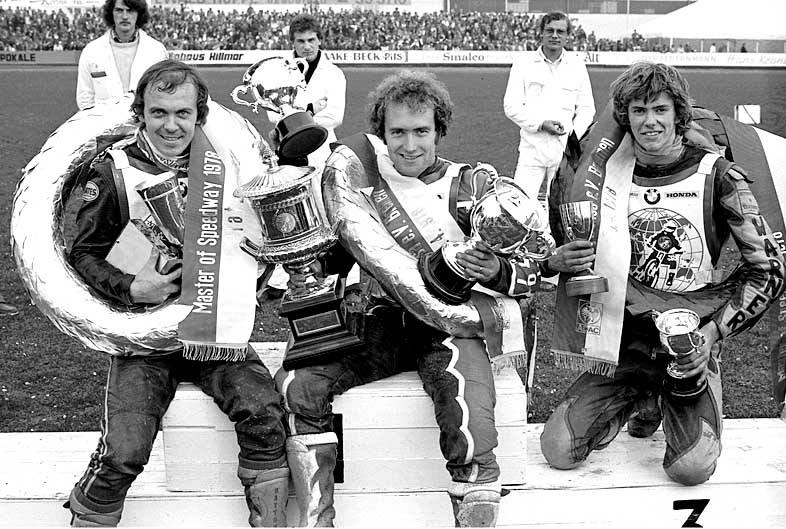

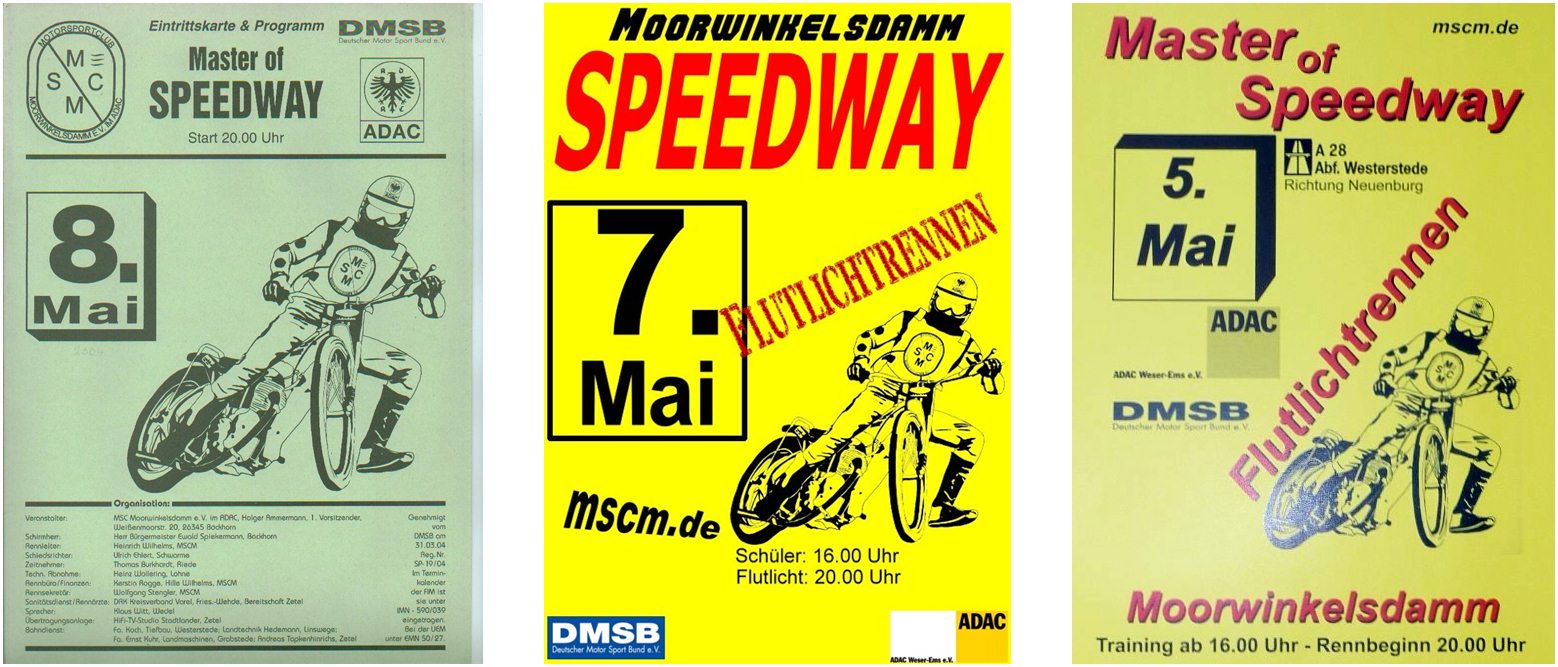
Bremen 1979: B.Penhall, O.Olsen, P.Collins Moorwinklesdamm 2010: T.Proctor,
B.Barker, A.Skornicki
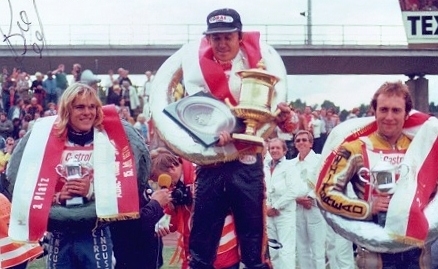

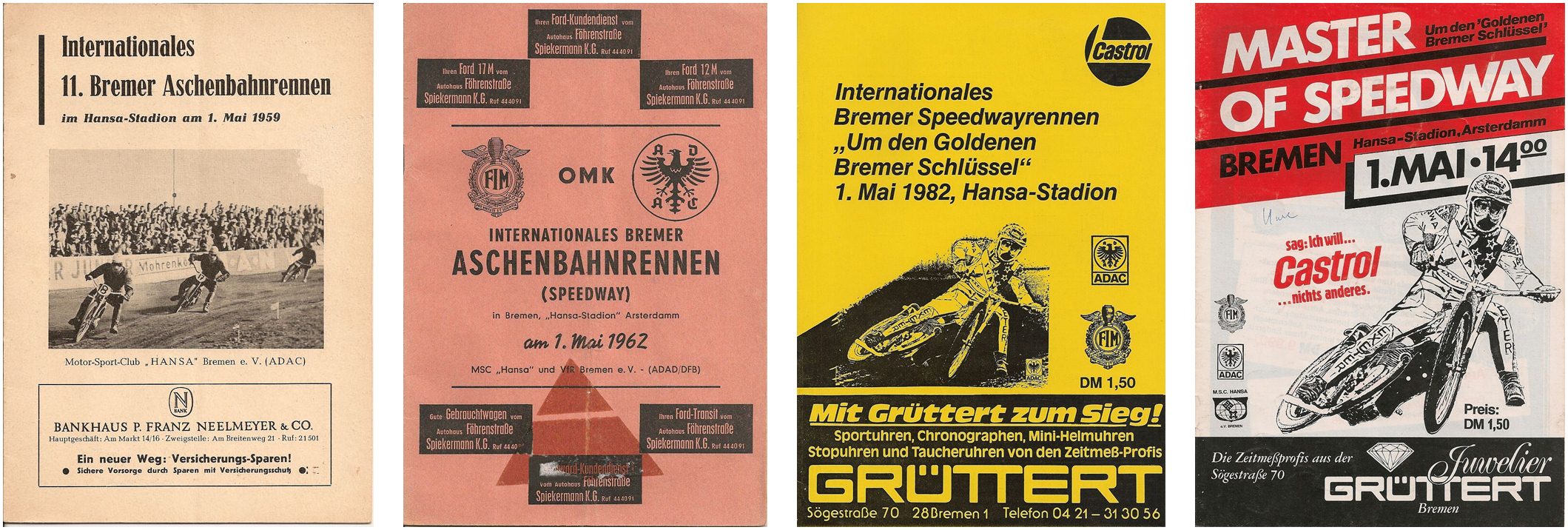
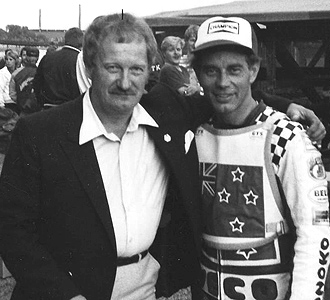
The first of 30 years of the Golden Key presentations was made to Swindon & Stoke rider Ray Harris, being equal top scorer of a Best Pairs meeting but having recorded the faster time. Finnish champion Kalevi Lahtinen then had 3 consecutive wins in the mid-'60s before Ivan Mauger (with Lahtinen, rt.) entered the scene and dominated it for the next 10 years, only World Championship qualifying meetings, for which he was ineligible, preventing him from making a clean sweep. His 8 wins nonetheless remained unsurpassable. Though the fields of the FIM-status meetings included many world champions and stars, after Mauger's time only Hans Nielsen(3x) and Sam Ermolenko(2x) were subsequently able to replicate a win.
1966: the evening Civic Reception, L.to Rt:
Mrs Gunkild Malmqvist, Gunnar
Malmqvist (Sw.2nd), Hans Nelsen,1983
Kahlevi Lahtinen (Fin, Winner), + MoS Trophy &
Conny Samuelsson (Sw.7th), Matti
Olin (Fin, 8th) Golden Key
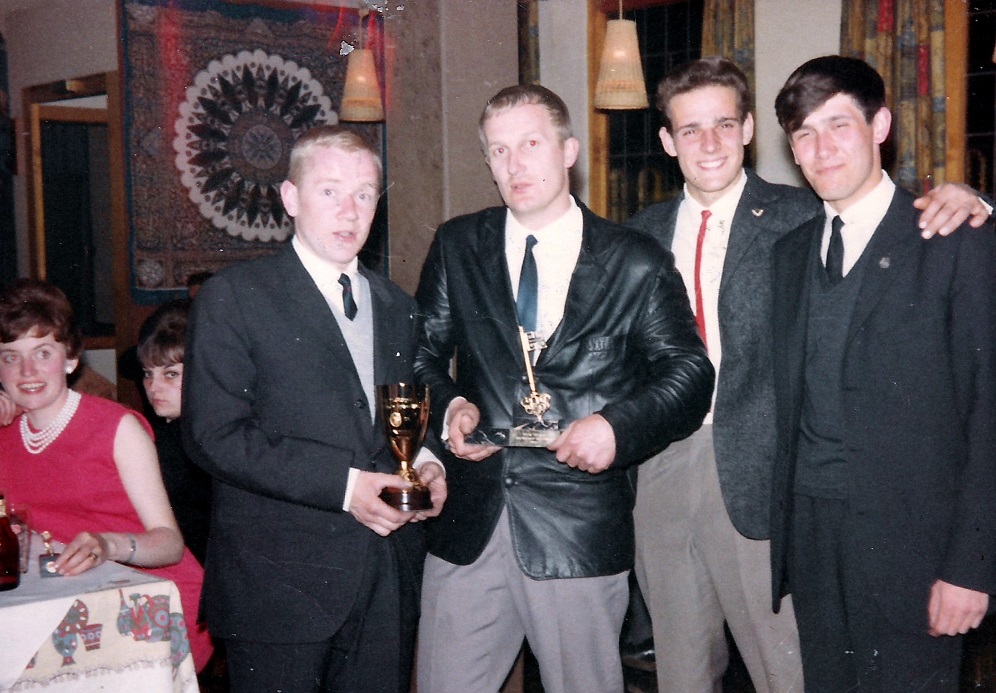
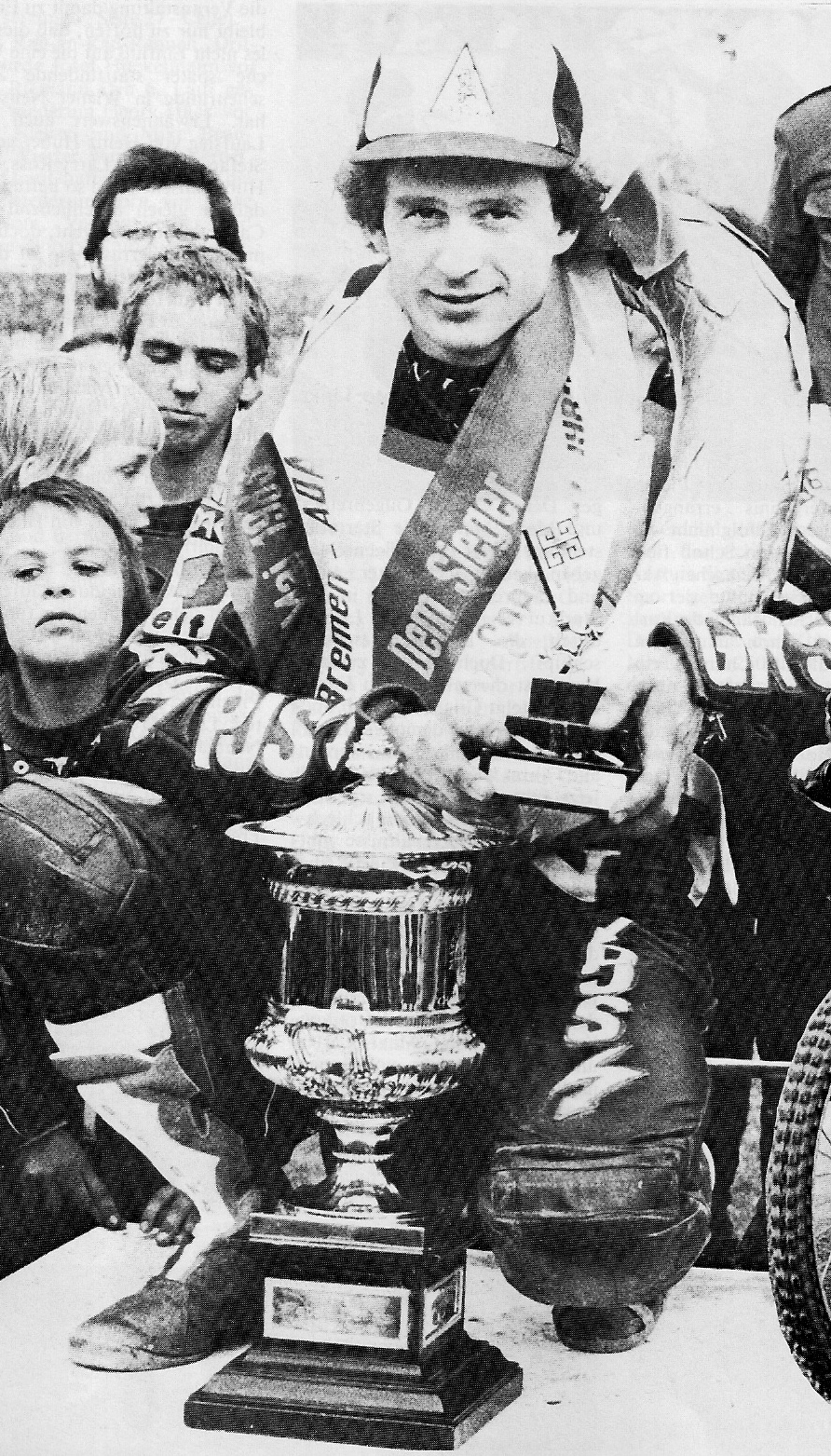
n.b:
With loss of the Hansa Stadium the Golden Key became an indoor
Ice-speedway event in the Bremen Stadhalle for the following 3 years.
A 2-day event initially, the 'Master of Speedway' was added to the
week-end programme in the second and third years. (This site does not
cover indoor speedway but these results are included here for
completeness of the G.Key & MoS story.)
| GOLDEN KEY of BREMEN | MASTER OF Indoor Ice SPEEDWAY | |||
| 1989 | (2-day) Klaus Lausch GY | NO COMP'N | ||
| 1990 | (Day1) Andre Pollehn GY | (Day2) Andre Pollehn GY | ||
| 1991 | (Day1) Petr Vandirek CZ | (Day2) Andre Pollehn GY |
ADMV SILVER STEELSHOE of EAST GERMANY
When the political decision was taken by the communist DDR authorities in 1972 to curtail participation in world championships and major international races in "capitalistic countries" and to prohibit Western riders from East Germany, a new "international" competition with FIM recognition involving only Eastern Europeans was instigated as compensation. Organized by the MC Meissen club, the race for the "Silver Steelshoe" trophy has been held in early October each year since.
Initially
a multi-round event with up to 4 other clubs, - in '74 it took the
form of an international team match between E.Gy, Cz, Bulgaria and
Hungary, with 3 legs in each country except the latter, and riders
from Bulgaria being denied permission to travel outside their own
domestic border -, after the Iron Curtain came down the competition
eventually became exclusive to Meissen and open to Westerners, being
won by New Zealander Mitch Shirra in '90. Martyn Cox took the trophy
in '94 and Jester B.Jensen in '96: in the 21st century local lad Ronnie Weis has had 7
wins incl'g his retirement year of 2023.
Güstrow 1984 Meissen 1998 Meissen 2011
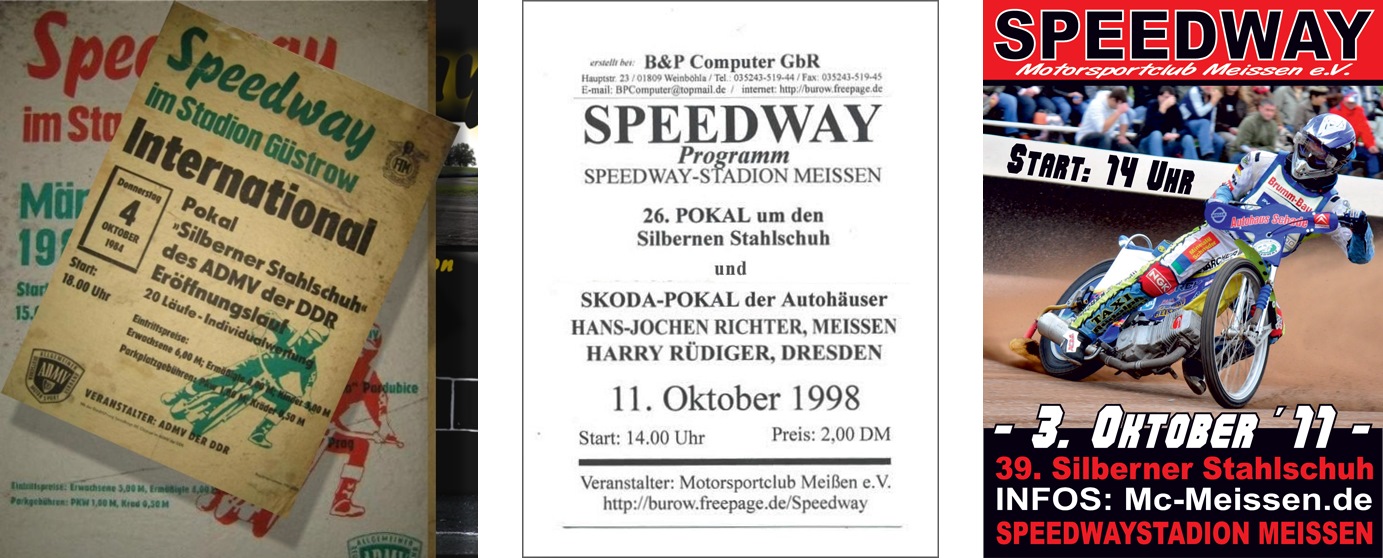
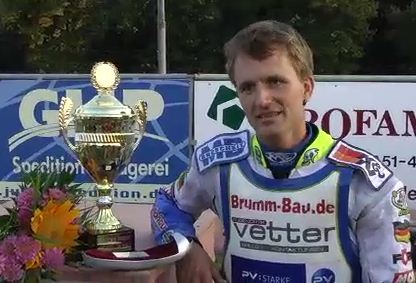
.
GOLD BAR, DENMARK
.
.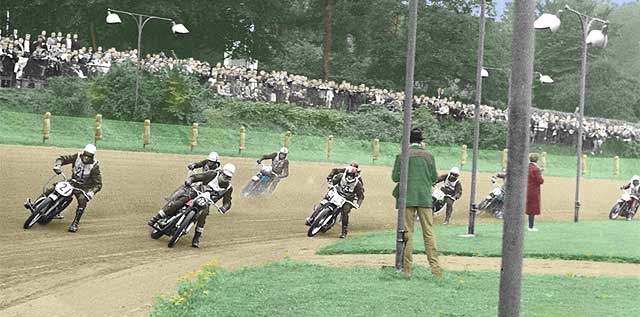
Charlottenlund Long Track, 1959
.
The Vojens Center staged the event in 1980 and it had a long run there until the end of the century. Denmark's World Champs Gundersen, Nielsen and Pedersen plus Tommy Knudsen each had 3 successes, most memorable being the exhilarating race by Jan.O. Pedersen for the 1990 title, - 8 riders over 8 laps -, a much-viewed video since that time. See table footnote for race formats: riders, laps, handicapping.
During the same period two Long Track Gold Bar meetings were again held at Charlottenlund, in '83 and '84. UK's Simon Wigg was runner-up each time, (despite the presence of Ivan Mauger: being late in his career, a Gold Bar, like a Pardubice Golden Helmet, eluded him.) Failed noise trials ended racing at this venue. Kurt W.Pedersen had been a 6x Gold Bar winner during the years of its initial Long Track format.
7x winner Ole Olsen Erik Gundersen 1986
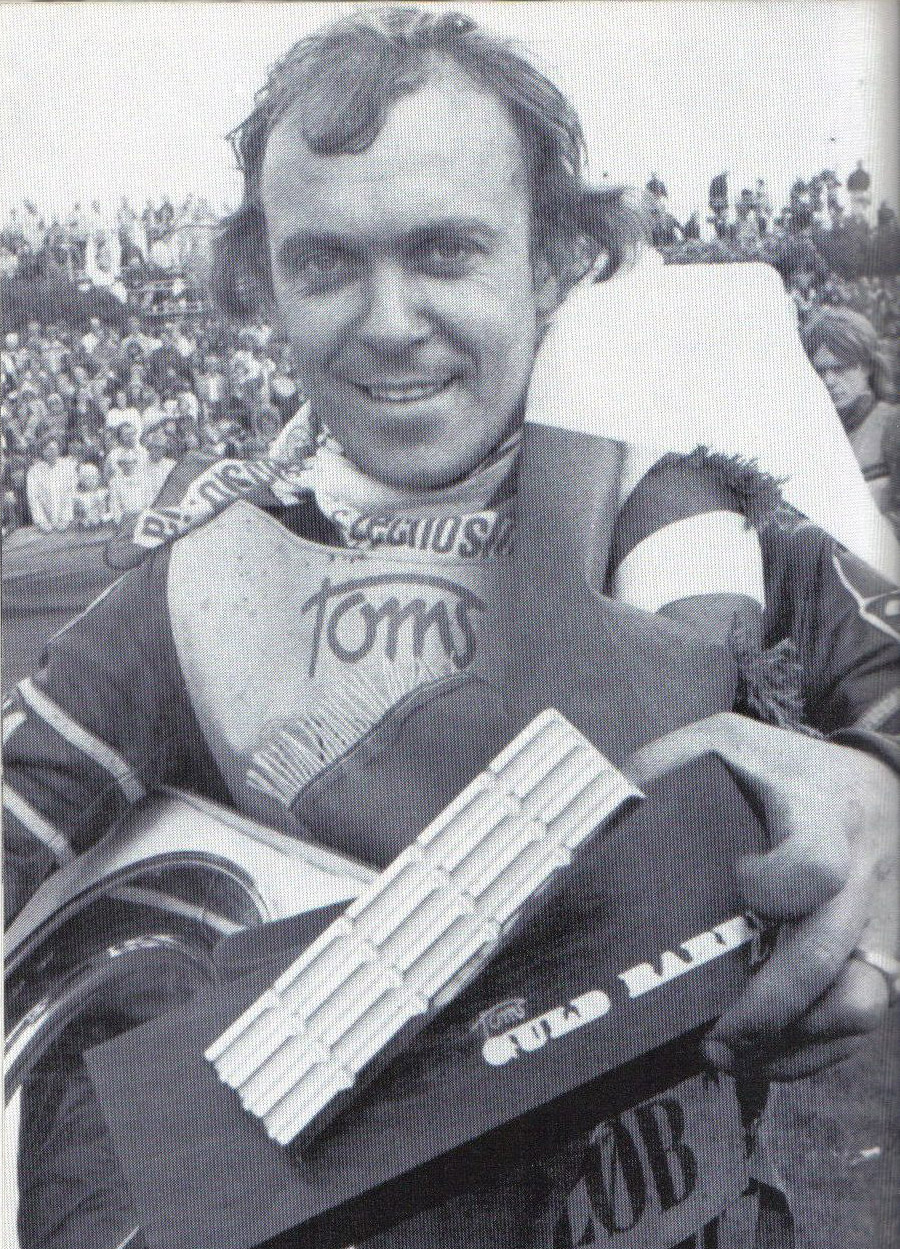
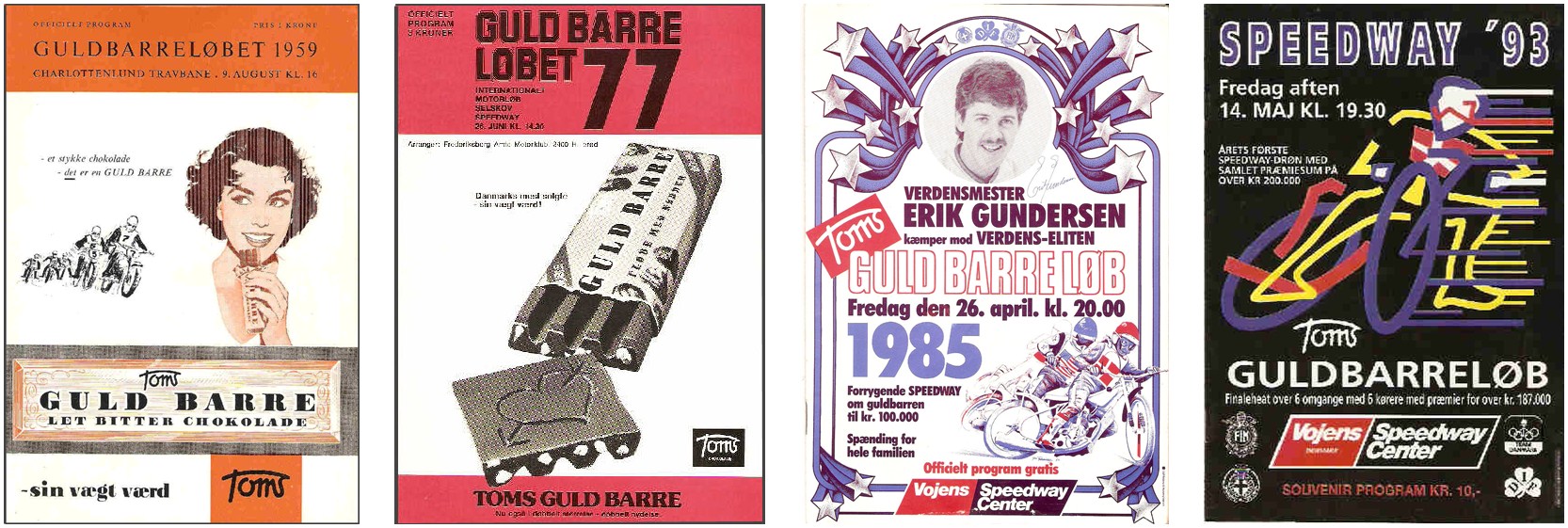
Another
gold version of confectionary, a Gold Bear, (Guldbamse, or Goldbär
in German) has been presented for a Long Track competition by a
Danish club during most of the last decade, initially in Denmark but
latterly held just across the border in Germany but under Danish regs. of
the DMU. Finn Appe Mustonen, having won 3 consecutive times at the
825m Jübek sandtrack now gets to keep the valuable 24 carat gold
trophy replica of the sponsor's candy sweet.
(prog. & price in Danish) (prog. & price in German)
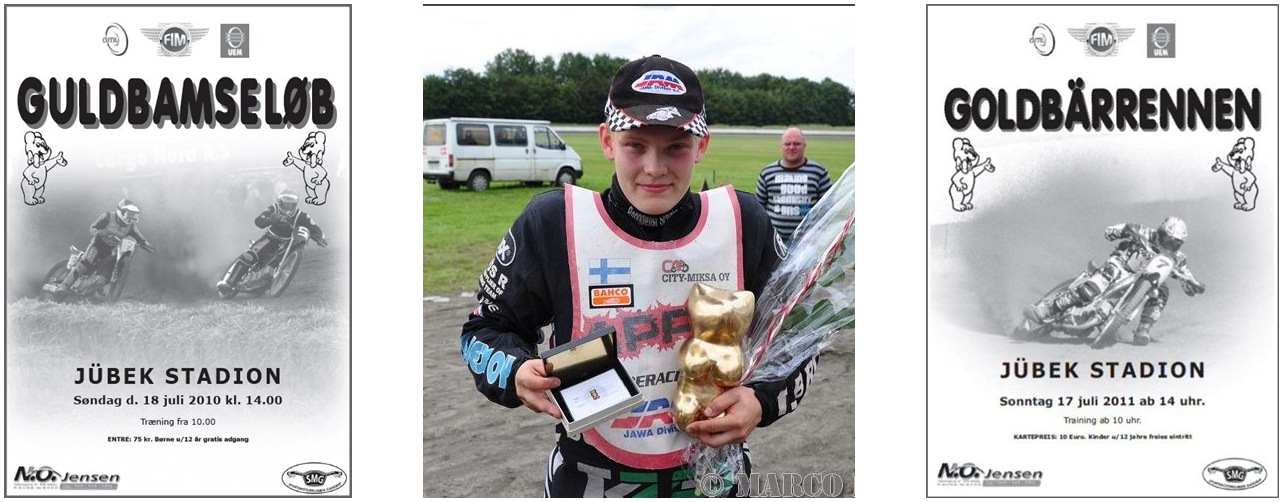
GOLDEN HAMMER - Cradley
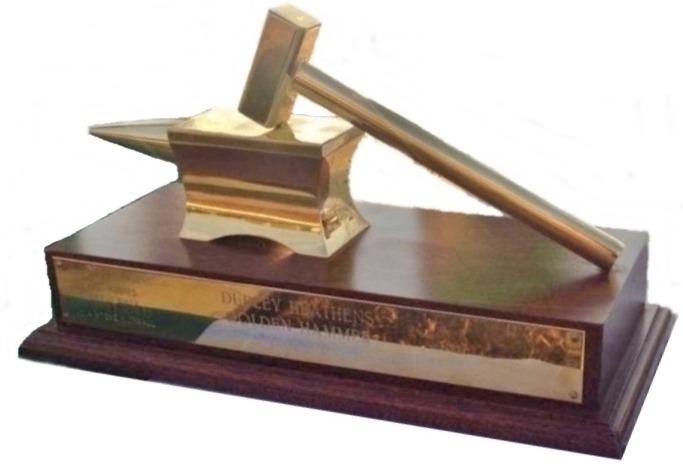 The
Golden Hammer trophy replaced Cradley's AHMT as its big-name
individual competition and has been raced for during each
of the Heathens' 4
guises since its inception in 1977, - 'Cradley
Heath Heathens' at
Dudley Wood, 'Cradley
& Stoke Heathens' at
Chesterton, 'Dudley
Heathens' at
Monmore Green, Wolverhampton, and finally 'Cradley Heathens' at both B'ham Perry Barr and Monmore Green. Until
2010 the competition has always attracted world-class riders, 10 of
its 20 winners being World Champions at some point in time,
including Sam Ermolenko 3 wins, and Erik Gundersen 2 wins. Heathens'
own riders have had 8 successes. At 3rd tier level speedway, Steve Worrall has been a 2-time winner.
The
Golden Hammer trophy replaced Cradley's AHMT as its big-name
individual competition and has been raced for during each
of the Heathens' 4
guises since its inception in 1977, - 'Cradley
Heath Heathens' at
Dudley Wood, 'Cradley
& Stoke Heathens' at
Chesterton, 'Dudley
Heathens' at
Monmore Green, Wolverhampton, and finally 'Cradley Heathens' at both B'ham Perry Barr and Monmore Green. Until
2010 the competition has always attracted world-class riders, 10 of
its 20 winners being World Champions at some point in time,
including Sam Ermolenko 3 wins, and Erik Gundersen 2 wins. Heathens'
own riders have had 8 successes. At 3rd tier level speedway, Steve Worrall has been a 2-time winner.
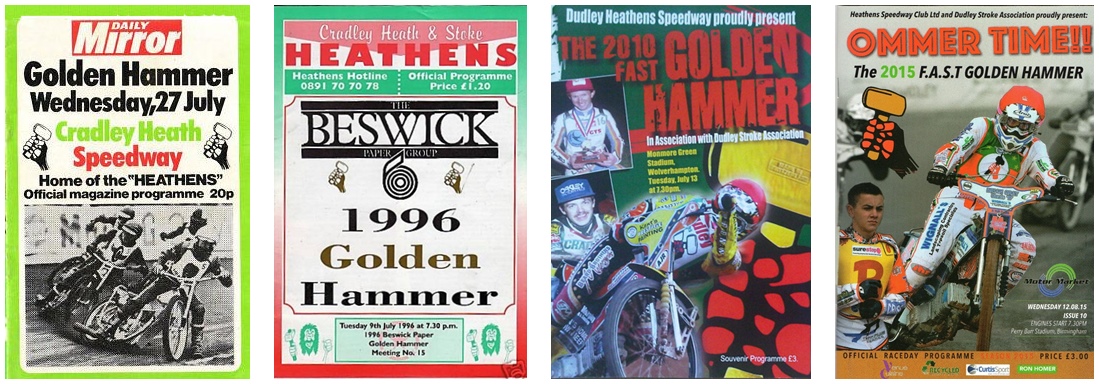 Cradley 1977 (1st) Stoke 1996 W'ton 2010 B'ham 2015
Cradley 1977 (1st) Stoke 1996 W'ton 2010 B'ham 2015Golden Hammer 2016: Steve Worrall's 2nd win.
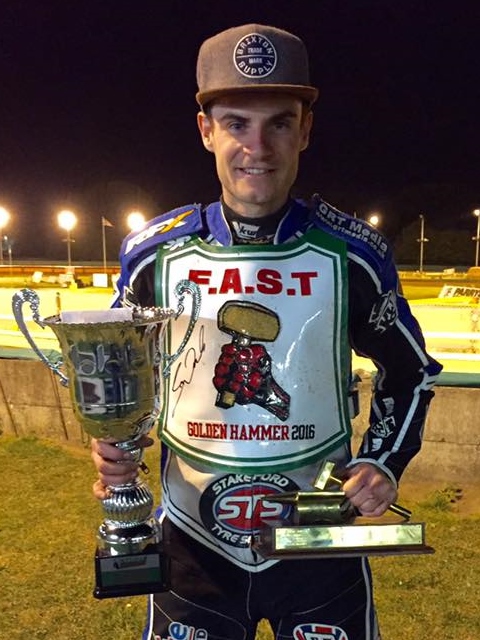
GOLDEN GALA of LONIGO, ITALY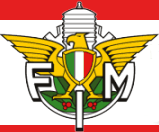 Not
to be outshone, Italy, via the Motor Club of Lonigo, introduced its
'Gold' competition to bring the world's top riders to its shores in
1980, the trophy being a gold plated rider's steel shoe, (as well as
some of the largest cups yet seen, apparently to each of the 6-man
finalists.) Its list of winners has 16 world champions over the 24
years of operation with Yanks and Danes dominating until the last
decade, when Jason Crump matched Hans Nielsen's total of 4 wins.
Ivan Mauger made just one appearance late in his riding career (in
'83) but didn't make the podium. .
Not
to be outshone, Italy, via the Motor Club of Lonigo, introduced its
'Gold' competition to bring the world's top riders to its shores in
1980, the trophy being a gold plated rider's steel shoe, (as well as
some of the largest cups yet seen, apparently to each of the 6-man
finalists.) Its list of winners has 16 world champions over the 24
years of operation with Yanks and Danes dominating until the last
decade, when Jason Crump matched Hans Nielsen's total of 4 wins.
Ivan Mauger made just one appearance late in his riding career (in
'83) but didn't make the podium. . 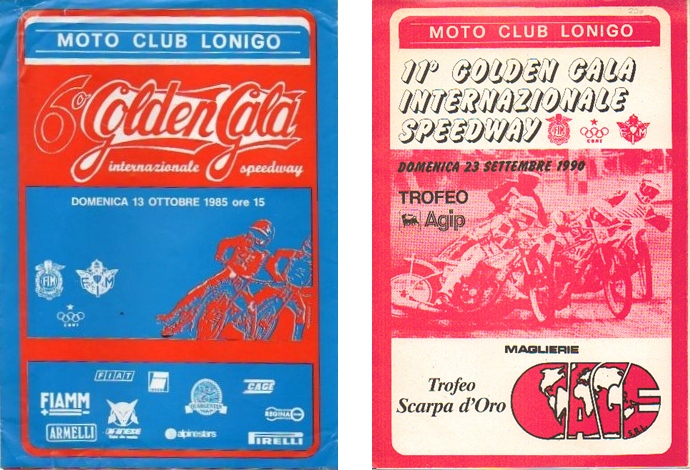
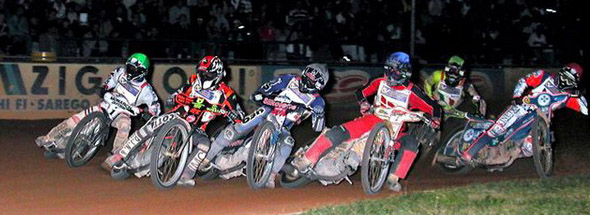
2000, GG Final
1980 (1st GG), Bruce Penhall 1989, E.Gundersen, Jeremy Doncaster, Ronnie Correy 